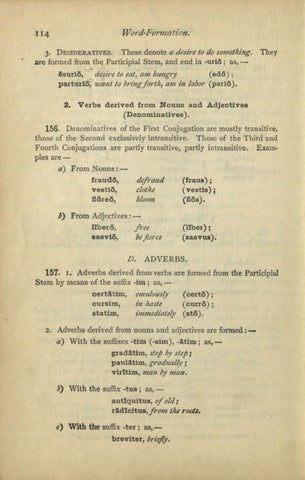Word-Formation.
114
3. DESIDERATIVES.These denote a desire to do something. are formed from the Participial Stem, and end in -urid j as,-
They
,.;"
esuno, parturio:
desire to eat, am hungr)! (edo) j Wa1zt to bring forth, am in labor (pario).
2. Verbs
derived from Nouns (Denominatives)
and Adjectives .
156. Denominatives of the First Conjugation are mostly transitive, those of the -Second exclusively intransitive. Those of the Third and Fourth Conjugations are partly transitive, partly intransitive. Examples area) From Nouns:fraudo, vestio, floreo,
difraud clothe bloom
(fraus) ; (vestis) ; (flOB).
free befierce
(ITher) ; (saevus).
b) From Adjectives: Ifbero, saevio,
D.
ADVERBS.
157. I. Adverbs derived from verbs are formed from the Participial Stem by means of the suffix -im j as,certatim, cursim, statim, 2.
e11zulously i,z haste immediately
(certo) ; (currd) j (sto).
Adverbs derived from nouns and adjectives are formed:-
a) With the suffixes -tim (-sim), -atim
j
gradatim, step by step; paulatirn, gradually ; virrtim, man by man. ~) With the suffix -tus
j
as,-
antiquitus, of old; rlidicitus, from the roots.
e) With the suffix -ter; as,breviter,
bri¢ly.
as,-
